2025.09.01
News
Faculty of Economics: Hideharu Tachibana of JICA Delivers Special Lecture in International Cooperation Theory Class
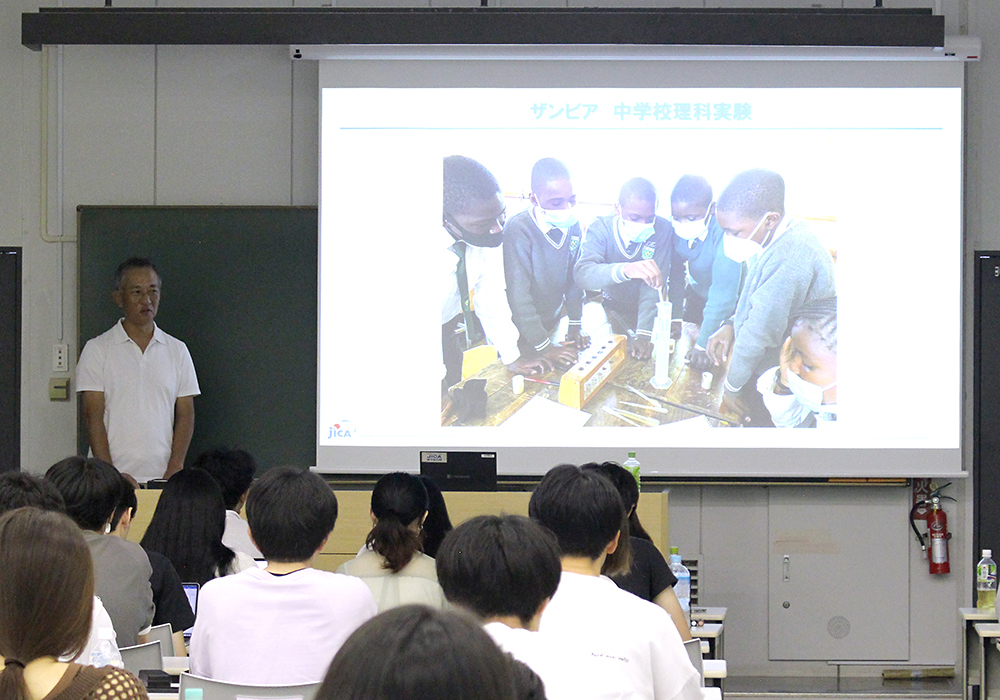
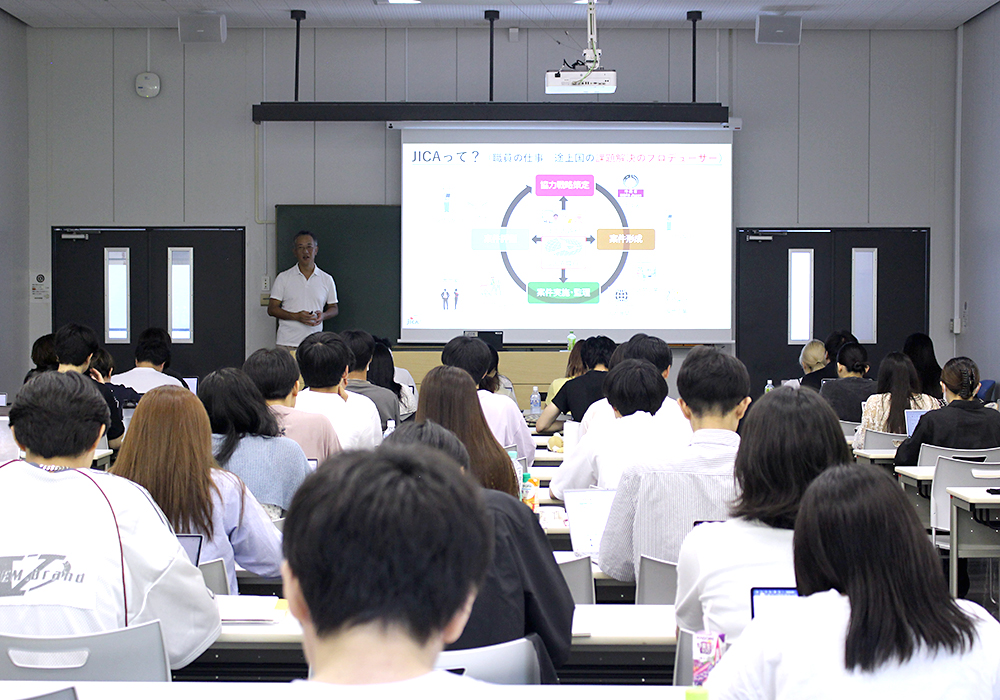
Learning from the Experience of JICA Volunteers: International Cooperation and Future Career Paths
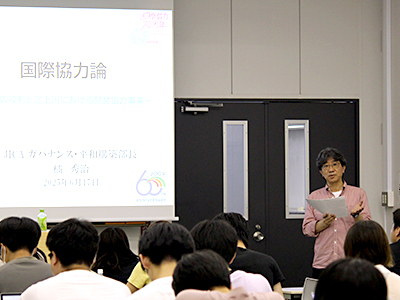
Six alumni from Professor Mitsuhiro Hayashi’s seminar have participated in the JICA volunteers.
On 17 June 2025, a special lecture for the “International Cooperation Theory” class (taught by Professor Mitsuhiro Hayashi, Faculty of Economics) was held in Building No. 7 on the Tama Campus. The class welcomed alumnus Mr. Hideharu Tachibana, Director of the Governance and Peacebuilding Department at JICA, who delivered a lecture on “JICA’s Role and Development Assistance Projects in Developing Countries.”
Tachibana discussed the current situation in developing countries, the complex web of crises facing the international community, and the importance of international cooperation, drawing on his own experiences. He engaged the audience by occasionally including quiz questions. The lecture provided students with a valuable opportunity to deepen their understanding of international cooperation and reflect on their potential career paths.
JICA’s Role and Development Assistance in Developing Countries
Understanding International Cooperation and JICA’s Role
Tachibana began the lecture by asking what international cooperation is. He explained that international cooperation supports countries and people in developing regions in their efforts to maintain peace, stability, and development of the entire global society. JICA plays a leading role in these efforts and is responsible for implementing Japanese ODA (Official Development Assistance). It is committed to fostering both “individuals and nations” in developing countries.
JICA acts as a “problem-solving producer” by providing tailored international cooperation that takes into account the specific circumstances of each country. Guided by its core principles of “human security” and “quality growth,” JICA pursues a vision of “forging bonds of trust across the world.”
Considering the Complex Web of Crises
Tachibana shared his experience conducting a market survey in South Sulawesi Province, Indonesia, during his time as a Japan Overseas Cooperation Volunteer (JICA volunteer). Like many other volunteers, he reflected, “I worked with local people and felt more supported by them rather than being supportive,” and “I learned far more from them than I was able to teach.” Tachibana’s experience was no exception to these reflections.
Tachibana further explained the “complex web of crises” that includes a range of global issues such as climate change, infectious diseases, conflict, and inflation. He noted that the poorest populations in developing countries are often the most vulnerable to these challenges. He emphasized the importance of addressing these issues in line with the guiding principle of “human security.“ “Human security” is an idea that protects all people’s rights to live with dignity. At this point, Tachibana quoted the phrase “A friend in need is a friend indeed” to underscore how this mindset is important when engaging in international cooperation.
Learning About International Cooperation
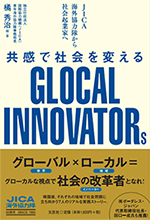
Tachibana also described his experience working on basic education in Africa. He explained efforts to build schools in Niger, Ethiopia, and Zambia, promote STEM (Science, Technology, Engineering and Mathematics) education, and train teachers. These are major challenges that contribute to improving children’s futures in light of the goals to address the shortage of learning opportunities, strengthen foundational academic skills, and help reduce poverty and health disparities. He also explained the evolution of the slogan for the “Minna no Gakko Project (School for All),” which shifted from “Education for all” to “Learning for all.” This was because he came to realize that while going to school is essential, the quality of learning is what matters most. In addition, Tachibana introduced several initiatives that have contributed to the further development of the JICA volunteer program during his tenure as Director General.
These included the “Glocal Program,” “BLUE,” which supports entrepreneurship, “Giving Back to Society Award,” which recognizes former volunteer members, and the “Support Fund,” a financial donation program.
Many returned volunteers are actively working in a variety of fields, including as JICA staff members, JICA experts, United Nations personnel, entrepreneurs, or by returning to their previous careers. This illustrates that the experience of volunteering in international cooperation can open pathways to diverse career.
In his book, JICA海外協力隊から社会起業家へ―共感で社会を変えるGLOCAL INNOVATORs (tentative translation: JICA Volunteers to Social Entrepreneurs: Changing Society through Empathy – GLOCAL INNOVATORs), Tachibana introduces examples of former volunteers who went on to become active social entrepreneurs.
To the Students
At the end of the lecture, Tachibana emphasized the importance of building cooperative relationships with the “Global South,” which is projected to account for approximately two-thirds of the world’s population by 2050. He said that JICA identifies issues faced on the ground in developing countries and works collaboratively in diverse environments to address social challenges. Through these efforts, JICA seeks to nurture human resources who can lead the societies of the future. He also introduced the JICA Global Agenda, covering 20 fields from the 4 perspectives of “Prosperity,” “People,” “Peace,” and “Planet.” Tachibana concluded his lecture with a message to students; “Countless opportunities lie ahead of you. Please continue exploring who you can become and what you can do.”
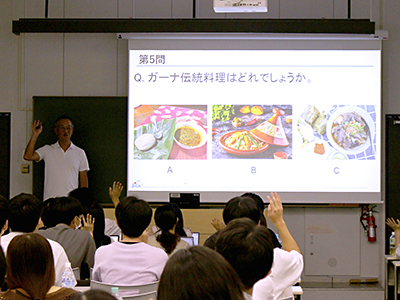
Tachibana giving a lecture with quiz questions.
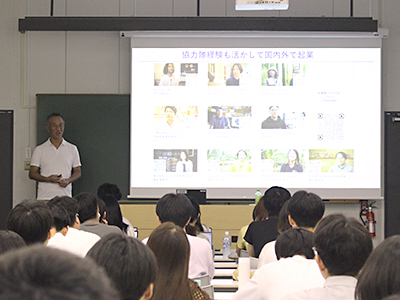
Introducing former volunteers who started businesses in Japan and abroad, drawing on their experiences.
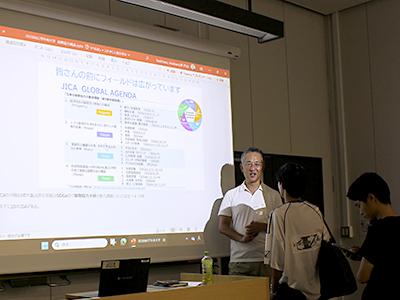
After the lecture, students asking questions individually.
Students’ Voices
Quoted from the student questionnaire
●The lecture was very interesting. I had the opportunity to hear firsthand about Mr. Tachibana’s experiences— what he thought and how he acted. He explained not only the academic aspects but also the local realities by using pictures, so I could gain an in-depth understanding of JICA and the JICA volunteers. From now on, I want to engage in international cooperation by considering not only my own perspective but also that of the others, so that we can learn from each other. (Year 4, Faculty of Economics)
●I learned a lot about Mr. Tachibana’s experience at JICA and the global situation through his personal experiences. The lecture reinforced my desire to take on the challenge of joining the JICA volunteers, which I have been interested in for a while. (Year 3, Faculty of Economics)
●I learned about the career paths available after returning from the JICA volunteers. I also gained insight into how we can develop ourselves by being volunteer members. Joining the program would surely be one valuable option for my future. In my future, I want to engage in business activities that maximize the value of developing countries. (Year 3, Faculty of Economics)
●After listening to the lecture, I became very interested in the JICA volunteers, which provide humanitarian support on the frontline. I was also impressed to learn that many returned volunteers are playing active roles, contributing to their fields around the world. When I heard that a returned volunteer had been selected for Forbes Japan’s the NEXT 100 list in the category of “People Who Can Save the World,” I had no doubt that their tenacious efforts and high level of expertise are driving forces of global change. I, myself, am thinking of working on the frontlines of international cooperation in the future. I am already in my third year and starting to think seriously about my career. While studying international cooperation in the Hayashi seminar, I sometimes ask myself, “Is what I’m studying truly useful for people in desperate need?” I realized how important it is to take action. As Mr. Tachibana told us, I want to be a considerate person whom others can trust, someone who is supported and accepted by those around me. I will do my best to improve myself during the remainder of my campus life and prepare to fully demonstrate my abilities once I enter society. (Year 3, Faculty of Commerce)
